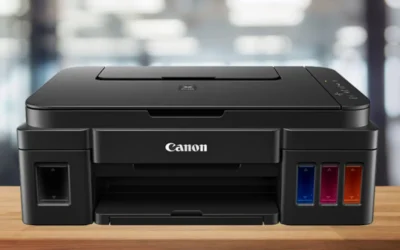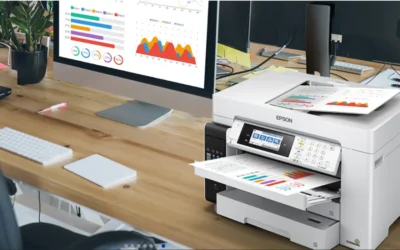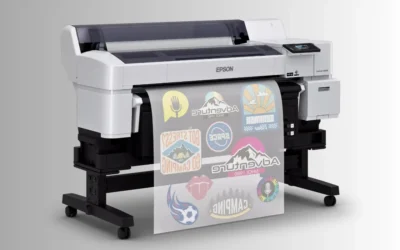Canon vs Epson Large Format Printers: Which One Should You Choose?
Selecting the right printer is critical when it comes to professional printing and can greatly impact on the quality, efficiency, and cost. Many businesses, design studios, and photographers have inevitably debated Canon vs Epson large format printers as both are leaders among inkjet printers. Both offer advanced technology and high-quality printed results, but they each have different strengths depending on your needs.
Evaluating both options goes beyond their brand name. Considerations should include print quality, media compatibility, ink technology, and total running costs. We will look at both options closely in this article for you to choose the option that best suits your workflow. By the end of the article, you will have a much better understanding of which large format printer will meet your professional needs and long-term intentions.
Key Differences Between Canon and Epson Large Format Printers
When evaluating both of these printing leaders, the most relevant features should be evaluated. The following sections show where Canon and Epson distinguish themselves, and potentially aid in deciding which would best suit your business needs.
Print Quality and Resolution
Canon’s large format printers are well-respected for producing sharp text performance and accuracy in color, making them a great solution for appropriate architectural drawings, technical plans and posters. Epson has a reputation for providing smooth gradations, vibrant colors, and detail while providing photographic quality, which makes them a more attractive option for photographers and art studios.
- Canon strength: Sharp detail, accurate lines, and consistent colors.
- Epson strength: Rich tonal range, deep blacks, and prints for the gallery.
Ink Technology Differences
Canon uses the LUCIA PRO pigment-based ink system for all prints, which ensures that they will be of archival quality and will reduce the risk of fading. Epson uses its UltraChrome pigment inks for prints that achieve a wide color gamut and are topped with longevity. The Canon inks dry quickly in comparison to the Epson inks, making them more efficient for high-volume printing. The Epson inks, however, will provide a greater subtlety in shades and gradients – useful for fine art prints or photographs.
Media Handling and Versatility
Canon is a user-friendly printer choice with adaptable roll handling capabilities, liners for quick production cycles, and is ideal for busy shop environments. Epson is known for affordable specialty media products with a diverse range, especially for textiles and fine art.
- Canon: Strong for posters, CAD drawings, and indoor displays.
- Epson: Excellent for fabric printing, photography, and artistic reproductions.
Speed and Efficiency
Generally, Canon printers have the speed advantage; they only lag on accuracy, making Canon printers suitable for high-pressure and high-volume production with CAD drawings and posters, somewhere you pressure speed over quality. Epson tends to focus on accuracy, articulation, and depth, which generally is a little slower than Canon but offers a very high accuracy and detail.
- Canon: Faster for large runs.
- Epson: Optimized for detail and photographic work.
Cost Considerations
Canon machines generally have a lower upfront cost, and their quick-dry inks save labor expense in the operation of the machine. Epson machines may have higher initial costs, but tend to be more cost-effective with their ink use in the long term, especially with end-use high-quality photo and artwork. When considering a cost comparison, we have found the following to be key considerations:
- Initial machine price
- Ink and consumables
- Maintenance and spare parts
- Energy usage and productivity
Customer Support and Reliability
Canon is reputable for longer life cycles, more durable equipment, and fewer paper jams. Epson is also reliable but may require slightly more regular service in a high-volume situation than is normal for similar office-type equipment. Canon’s global service networks give it a particular advantage, but Epson has strong service back-up in markets with large creative industries.
Use Cases: Who Should Buy What?
To further clarify the decision, here are some examples of applications for each brand:
- Design studios & architects → Canon for accurate details and speed.
- Photographers & Fine Artists → Epson for tonal depth and vivid detail.
- Commercial print shops → Canon for volume production and sign-making.
- Creative Agencies → Epson for different media and artistic outcomes.
Conclusion
The choice between Canon vs Epson large format printers comes down to your priorities. If you are concerned about printing posters, technical drawings, or signage quickly, accurately, and reliably, Canon has distinct advantages when it comes to printing speed and operational simplicity. If you are producing photography, fine art, or textiles, however, Epson offers unrivaled richness, detail, and flexibility. Both Canon and Epson are leaders in their fields, with exceptional capabilities that differentiate each brand. Ultimately, the best choice will depend on whether or not your company values speed and the associated reduced cost, or artistic attention to detail and variety. Assessing these factors carefully will allow you to feel confident to invest in a printer system that will fit into your workflow and give you consistent, high-quality, high-volume output for years to come.



